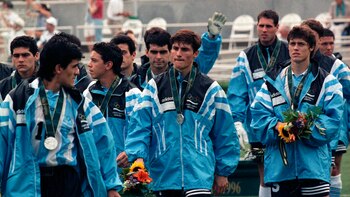
From this same space, we have referred to the strange and not always successful marriage between Olympism and football. It makes sense: there are hardly two more powerful corporations in the world of sports - just sports? - than the IOC and FIFA.
Absent in 1896, when some sources speak of an unofficial competition concurrent with the Athens games, and in 1932, when FIFA prioritized promoting its first World Cup, played two years earlier in Uruguay, football has had a stable Olympic presence, not in line with the sinuous regulations that invaded the development of the tournament over the decades.
There were fluctuations in the final tournament, especially adulterated after the creation of the Soviet bloc due to the confrontation between adult soccer players from the countries of the so-called Iron Curtain and youth players from other participating nations. The reason referred to those times when, while Olympism did not admit professional players, in countries such as the Soviet Union, Poland, Yugoslavia or Democratic Germany, even prominent figures in the senior world championships were not considered rented.
There were, and still are, fluctuations in the qualifying tournaments in which each regional confederation decides unilaterally within what age range the previous stages are played. It is common that, while a U21 tournament is played in Europe, it can be U19 in Asia and U18 in South America. The variables are even found within the same confederation. Without going any further, for Paris, Conmebol (South America) established that the category be U23, logical considering that this is the class established for the games themselves.
In any case, the Parisian event can reach a singular significance, similar to that of Rio 2016, in which the local team, led by Neymar, gave his country the last title it lacked in its history.
A few hours ago, it was one year since Lionel Messi’s Argentina defeated Kyllian Mbappé's France in the final of the World Cup in Qatar.
It was an extraordinary final due to an enormous number of factors; surely the best final in the history of that competition. Never before has there been a counterpoint between two leading soccer players like those of that Qatari night. Paradoxically, teammates at PSG.
Argentina led 2-0, then 3-2. France recovered at the hands of Mbappé, who scored the three goals scored by his national team. And in the last play of overtime, the two teams had the decisive goal within reach but were frustrated by an extraordinary intervention by Dibu Martinez (Argentine goalkeeper) against Kolo Muani and, immediately and without interruption, by a deflected header from Lautaro Martinez alone against the French goal.
Argentina won in the penalty shootout and established Lionel Messi as a genius with almost two decades of validity who, now, has won every possible title in his career. Just to put it in context, that record includes the Spanish League, the Copa del Rey, the Champions League, the Club World Cup, the FIFA World Cup... and the gold medal at the Beijing 2008 Olympic Games.
And I emphasize that last reference because it’s impossible not to think of an Olympic-style re-edition of that epic final at Stade de France.
By the way, there is still a long way to go before that happens. And I am not referring precisely to a question of the calendar, but to the fact that, just as France has a guaranteed place as a host, Argentina will have to play a very difficult qualifier next January. Only two of the ten participating teams will go to France in July.

But if Argentina were to win one of those places, the hope of an Olympic Messi once again has a singular accomplice in the coach of the Argentine team. This is Javier Mascherano, Lionel’s partner both in Barcelona and in Argentina; a personal friend of the star. Javier is one of the players who has best disseminated the Olympic spirit regardless of his nationality. Some time ago, Mascherano suggested the possibility of proposing to Messi to be one of the three over 23 years old allowed by regulations in each squad during the final stage of the games.
It’s more. It seems that, while no one will say anything publicly, they must have already talked about the matter.
So, a lover of both football and Olympism, we suggest you work hard so that Argentina surpasses the previous one by playing in Venezuela.
If that were the case, not only could we dream of a new France (Mbappé) - Argentina (Messi), but Olympic football would become the eye-catcher that never was in the universe of the rings.
Últimas Noticias
Sinner-Alcaraz, the duel that came to succeed the three phenomenons
Table tennis: Brazil’s Bruna Costa Alexandre will be Olympic and Paralympic in Paris 2024

Rugby 7s: the best player of 2023 would only play the medal match in Paris

Rhonex Kipruto, owner of the world record for the 10000 meters on the road, was suspended for six years

Katie Ledecky spoke about doping Chinese swimmers: “It’s difficult to go to Paris knowing that we’re going to compete with some of these athletes”





